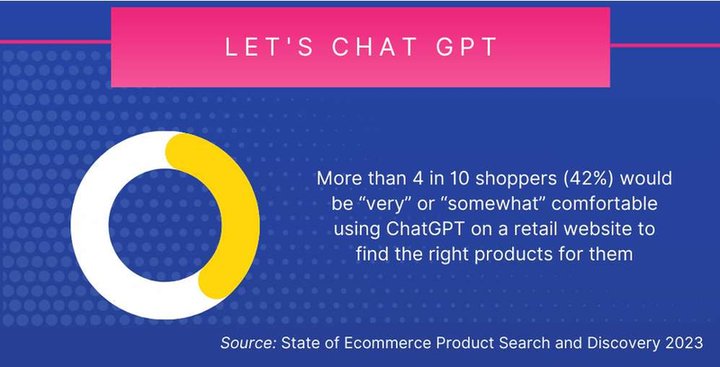Why ChatGPT and LLMs Should Be Your Secret Weapon This Holiday Season
By Eli Finkelshteyn
CEO and Co-Founder, Constructor
You’ve probably heard about ChatGPT. It’s likely you’ve also played around with it. What’s less likely is that you have technology on your ecommerce site based on large language models (LLMs) or transformers (the “T” in ChatGPT) yet. You may have heard the terms but thought they seemed more like technical details and jargon than something particularly important to ecommerce.
"Searching for gift guides and the like is currently done on Google, not on your site! This is not a great way of product discovery. If you do it right, why would shoppers need to go to Google at all?"
That’s set to change in the future, as these technologies are what let ChatGPT understand people typing in plain, human language in a way that was never previously possible. Although we’re still in the infancy of these technologies and how they can be applied to ecommerce, that infancy creates opportunities to stand out for those ecommerce leaders willing to experiment. And this holiday season might be one of the best times in history to do so.
Why? Because during the holiday season, more than any other time of year, people want to buy things — for friends, loved ones, or themselves — but aren’t sure what exactly to get.

Transforming how shoppers find products
There are probably a few ways people can discover products on your website right now. They can search, browse category pages, or interact with recommendations on your home page, product detail pages, and a few other areas. Maybe you even have a “gift finder” quiz. But what you don’t have is a way for people to tell you in human language what they’re looking for and for whom.
Really, the ideal — for shoppers and your business — is to let a shopper tell you: “I need a present for my mother. She likes hiking and cooking, and her tastes are eclectic. She’d rather have something beautiful than something strictly practical. What do you recommend?” That was never truly possible before with onsite search, at least not in any way where most such queries would be understood. But now, all of a sudden, with technology built on LLMs and transformers, it is possible. You can theoretically let people ask questions like these directly on your website and return products that fit their asks directly. These types of interactions and experiences were the stuff of dreams just a year ago. Although still experimental, they’re now possible.
Finding the perfect gifts
This is where technology based on LLMs and transformers becomes so appealing. If you do it right — if you let people do their research on your own website and enable them to explain, in their own words, what they need — and then show results that are both personalized (based on what you know about the person from their behavior across your channels) and reflect your real-time inventory… why would shoppers need to go to Google at all? Sure, plenty still will. This is still new technology, after all. But for those you convince not to, you’ll both have a much higher conversion rate (because they didn’t leave your site) and a lower cost of customer acquisition (for the same reason). And if you do a good job for them, they’ll tell their friends.
Plus, consumers have an appetite for technology that makes online shopping better. A recent survey showed 42% would be “very” or “somewhat” comfortable using ChatGPT on retail sites to find the right products for them — a number likely to increase as the technology becomes more pervasive.
We might be at the dawn of a new age of ecommerce innovation with LLMs and transformers. Some of the experiments we’ve run at my own company around open-form text with these technologies are starting to bear exciting results, and I know others are working on similar ideas in areas like customer support and content generation. It will take a while until they become mainstream, but imagine the head start and publicity you can get by being one of the first companies to get functionality based on this new technology right. And the cherry on top? The increases in conversion rate and decreases in cost of acquiring a customer likely more than cover the entire cost of implementing it to begin with.
Now, why is this so interesting for the holiday season specifically? Because of how much searching for gift guides and the like is currently done on Google, not on your site. Unless people have a pretty good idea of the kind of thing they want, there’s not a great way for them to discover it on your site using just the traditional methods of product discovery like searching, browsing, and recommendations. So instead, they leave your site to research on Google, and leave you sitting on your hands hoping they come back to buy what they found, rather than purchase via an affiliate link they found through Google. You can invest in SEO and ads hoping to draw shoppers back, but the fundamental problem is that they went to Google in the first place instead of coming directly to you.





Eli Finkelshteyn is the co-founder and CEO of Constructor (www.constructor.io), an artificial intelligence (Al)-based product discovery and search platform used by ecommerce companies worldwide, including Sephora, American Eagle, Petco, Birkenstock, Target Australia and many more. Formerly a data scientist and engineer, Eli has spent over 15 years working in the areas of machine learning and natural language processing.